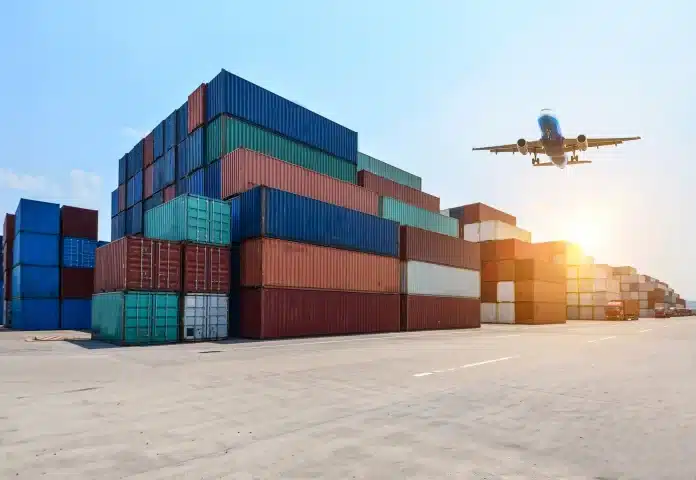In today’s fast-paced and competitive business environment, effective transportation management plays a crucial role in ensuring the smooth movement of goods throughout the supply chain. Implementing a TMS has become increasingly important for businesses looking to streamline operations, reduce costs, enhance visibility, and improve customer service.
In this guide, we will provide an overview of TMS and explore its features, benefits, and impact on supply chain management. We will also discuss the emerging technologies shaping the future of TMS to provide valuable insights into how TMS can optimize your transportation operations.
Table of Content:
Table of Content

The Key Features of a Transportation Management System
A Transportation Management System (TMS) offers a comprehensive set of features designed to optimize the planning, execution, and optimization of transportation activities. By harnessing advanced technologies, TMS empowers businesses to enhance efficiency, reduce costs, improve customer service, and streamline their transportation operations.
Real-time tracking with IoT fleet monitoring
One of the key features of a TMS is real-time tracking of shipments through IoT fleet monitoring. By leveraging sensor technology and IoT devices, businesses can monitor the location, status, and condition of goods throughout the transportation journey. This enables them to gain valuable insights and make dynamic route adjustments to ensure on-time deliveries and minimize disruptions.
Analyzing data with digital assistants and machine learning
TMS utilizes digital assistants and machine learning algorithms to analyze vast amounts of data, enabling businesses to forecast future demand and make data-driven decisions. These technologies can analyze historical transportation patterns, identify trends, and optimize resource allocation.
Why Implement a Transportation Management System?
Implementing a Transportation Management System (TMS) is crucial for businesses to enhance supply chain efficiency and meet evolving consumer expectations. A TMS optimizes routes, reduces transit times, and provides real-time updates to customers.
With a TMS, businesses can strategically plan shipments, allocate resources efficiently, and track goods throughout the supply chain. This visibility helps optimize routing and minimize transit times, leading to cost savings and improved operational efficiency.
Additionally, a TMS fulfills the demand for real-time updates and accurate delivery information, enhancing customer satisfaction and loyalty. As consumer expectations evolve, implementing a TMS ensures businesses can adapt and maintain efficient, transparent transportation processes.
Who Benefits from Using a Transportation Management System?
Transportation Management Systems (TMS) benefit various stakeholders in the supply chain, including shippers, carriers, retailers, logistics providers, and consumers. TMS optimizes operations, providing enhanced visibility and efficiency.
Shippers gain real-time tracking, route optimization, and improved delivery efficiency, leading to cost savings and better customer satisfaction. Carriers use TMS for capacity management and asset utilization, making informed decisions for increased profitability and efficiency.
Retailers enhance inventory management, ensure timely deliveries, and improve omnichannel capabilities by integrating TMS with their systems, reducing stock-outs, and improving order fulfillment.
Logistics providers streamline operations, reduce manual tasks, and increase efficiency with TMS, focusing on strategic activities and optimizing routes to reduce costs. Consumers benefit indirectly from accurate delivery information, flexible options, and proactive communication, enhancing satisfaction and loyalty.
Planning and Execution with a Transportation Management System
A TMS streamlines freight movements through efficient planning, execution, and optimization, ensuring timely deliveries while reducing costs. By planning routes and scheduling shipments, businesses can optimize resources for cost-effective logistics.
One of the key advantages of a TMS is access to real-time data and analytics. This up-to-date information allows businesses to make informed decisions, adapt to changing circumstances, and proactively solve problems, ensuring smooth operations. Analytics optimize routes, improve resource allocation, and enhance overall transportation efficiency.
Real-time visibility into transportation operations helps identify bottlenecks, implement improvements, and respond promptly to issues, ensuring businesses meet customer expectations and maintain a competitive edge.
Utilizing a TMS enables businesses to achieve cost-effective and timely deliveries through optimized freight movements and informed decision-making.
The Advantages of Cloud-Based TMS Solutions
Cloud-based Transportation Management Systems (TMS) offer significant advantages for optimizing transportation operations. Key benefits include cost-effectiveness, scalability, and accessibility.
Unlike traditional on-premises systems, cloud TMS eliminates the need for expensive hardware and software installations, reducing both upfront and ongoing costs. Its scalability allows businesses to easily adapt to changing transportation needs without the limitations of on-premises systems.
Cloud TMS also offers unparalleled accessibility, enabling stakeholders to access the system from anywhere with an internet connection. This enhances collaboration, improves communication, and supports real-time decision-making.
Embracing cloud-based TMS solutions optimizes transportation operations, providing a cost-effective, scalable, and accessible system that positions your business for success in a competitive market.
The Impact of TMS on Supply Chain Management
The implementation of a Transportation Management System (TMS) has a significant impact on supply chain management. By enhancing visibility, reducing costs, and improving customer service, TMS plays a pivotal role in optimizing supply chain operations for businesses. Let’s explore how TMS implementation brings about these positive changes and examine some success stories.
1. Enhancing visibility
TMS provides real-time tracking and monitoring of shipments, enabling businesses to have better visibility into their transportation operations. With access to accurate and timely information, businesses can proactively address any issues that may arise, such as delays or disruptions, thus improving overall supply chain visibility. This enhanced visibility allows for more efficient decision-making and resource allocation.
2. Reducing costs
TMS helps in reducing costs through various mechanisms. One of the key ways is route optimization, which allows businesses to identify the most efficient routes for transportation, considering factors such as distance, traffic conditions, and available resources.
By optimizing routes, businesses can minimize fuel consumption, reduce transportation costs, and improve delivery timelines. TMS also enables effective carrier management, ensuring that businesses have access to a diverse pool of reliable and cost-effective carriers.
Additionally, the automation of various transportation processes, such as order consolidation and freight settlement, reduces manual labor and administrative costs.
3. Improving customer service
TMS plays a crucial role in improving customer service by providing timely updates, accurate delivery information, and improved communication. Through real-time tracking and monitoring capabilities, businesses can provide customers with up-to-date information about the status and location of their shipments.
Furthermore, TMS enables businesses to communicate with customers proactively, informing them of any delays or changes in the delivery schedule. This proactive approach helps businesses manage customer expectations and provide superior customer service.
Emerging Technologies and the Future of TMS
Artificial intelligence (AI), blockchain, and cold chain management are transforming Transportation Management Systems (TMS). These technologies enhance the efficiency, security, and reliability of transportation logistics.
AI improves TMS by optimizing routes and using predictive analytics to reduce delivery times and costs. Blockchain provides transparency and security by ensuring tamper-proof records of supply chain transactions, reducing fraud risk.
Cold chain logistics within TMS is crucial for transporting temperature-sensitive goods, offering real-time temperature monitoring to ensure product integrity and reduce spoilage.
The future of TMS includes greater automation, IoT integration, and improved supply chain collaboration. Embracing these technologies leads to enhanced efficiency, lower costs, and higher customer satisfaction.
Conclusion
Implementing a Transportation Management System (TMS) helps businesses streamline processes, reduce costs, enhance visibility, and improve customer service. By utilizing advanced technologies, TMS optimizes transportation logistics, providing significant benefits to various stakeholders.
A TMS offers comprehensive features to optimize transportation activities, enhancing efficiency and reducing costs. Real-time tracking, data analysis, and machine learning capabilities ensure timely deliveries and improved customer service.
To leverage these benefits, HashMicro Fleet Management Software stands out as a comprehensive solution to optimize logistics. This software is designed to integrate seamlessly with your transportation operations and offer cost-effectiveness, scalability, and accessibility.
Discover how HashMicro solution can optimize your transportation management by trying our free demo today!






















































